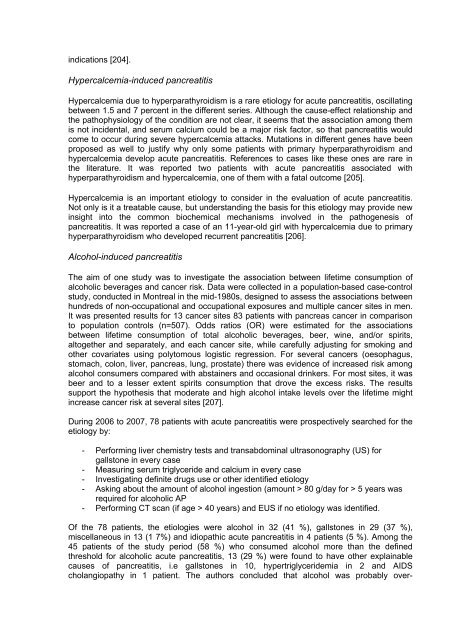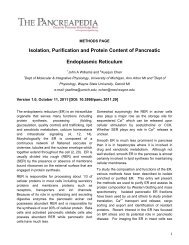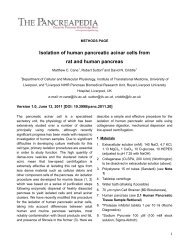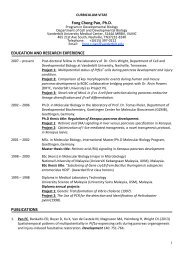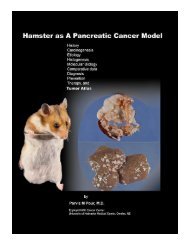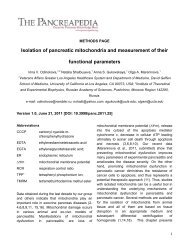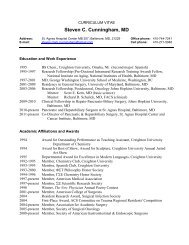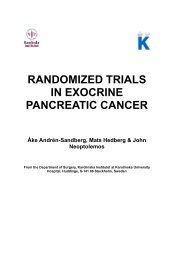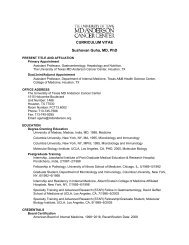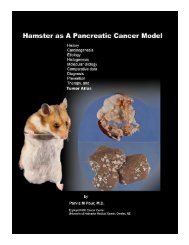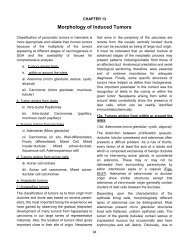review of literature on clinical pancreatology - The Pancreapedia
review of literature on clinical pancreatology - The Pancreapedia
review of literature on clinical pancreatology - The Pancreapedia
You also want an ePaper? Increase the reach of your titles
YUMPU automatically turns print PDFs into web optimized ePapers that Google loves.
indicati<strong>on</strong>s [204].Hypercalcemia-induced pancreatitisHypercalcemia due to hyperparathyroidism is a rare etiology for acute pancreatitis, oscillatingbetween 1.5 and 7 percent in the different series. Although the cause-effect relati<strong>on</strong>ship andthe pathophysiology <str<strong>on</strong>g>of</str<strong>on</strong>g> the c<strong>on</strong>diti<strong>on</strong> are not clear, it seems that the associati<strong>on</strong> am<strong>on</strong>g themis not incidental, and serum calcium could be a major risk factor, so that pancreatitis wouldcome to occur during severe hypercalcemia attacks. Mutati<strong>on</strong>s in different genes have beenproposed as well to justify why <strong>on</strong>ly some patients with primary hyperparathyroidism andhypercalcemia develop acute pancreatitis. References to cases like these <strong>on</strong>es are rare inthe <str<strong>on</strong>g>literature</str<strong>on</strong>g>. It was reported two patients with acute pancreatitis associated withhyperparathyroidism and hypercalcemia, <strong>on</strong>e <str<strong>on</strong>g>of</str<strong>on</strong>g> them with a fatal outcome [205].Hypercalcemia is an important etiology to c<strong>on</strong>sider in the evaluati<strong>on</strong> <str<strong>on</strong>g>of</str<strong>on</strong>g> acute pancreatitis.Not <strong>on</strong>ly is it a treatable cause, but understanding the basis for this etiology may provide newinsight into the comm<strong>on</strong> biochemical mechanisms involved in the pathogenesis <str<strong>on</strong>g>of</str<strong>on</strong>g>pancreatitis. It was reported a case <str<strong>on</strong>g>of</str<strong>on</strong>g> an 11-year-old girl with hypercalcemia due to primaryhyperparathyroidism who developed recurrent pancreatitis [206].Alcohol-induced pancreatitis<strong>The</strong> aim <str<strong>on</strong>g>of</str<strong>on</strong>g> <strong>on</strong>e study was to investigate the associati<strong>on</strong> between lifetime c<strong>on</strong>sumpti<strong>on</strong> <str<strong>on</strong>g>of</str<strong>on</strong>g>alcoholic beverages and cancer risk. Data were collected in a populati<strong>on</strong>-based case-c<strong>on</strong>trolstudy, c<strong>on</strong>ducted in M<strong>on</strong>treal in the mid-1980s, designed to assess the associati<strong>on</strong>s betweenhundreds <str<strong>on</strong>g>of</str<strong>on</strong>g> n<strong>on</strong>-occupati<strong>on</strong>al and occupati<strong>on</strong>al exposures and multiple cancer sites in men.It was presented results for 13 cancer sites 83 patients with pancreas cancer in comparis<strong>on</strong>to populati<strong>on</strong> c<strong>on</strong>trols (n=507). Odds ratios (OR) were estimated for the associati<strong>on</strong>sbetween lifetime c<strong>on</strong>sumpti<strong>on</strong> <str<strong>on</strong>g>of</str<strong>on</strong>g> total alcoholic beverages, beer, wine, and/or spirits,altogether and separately, and each cancer site, while carefully adjusting for smoking andother covariates using polytomous logistic regressi<strong>on</strong>. For several cancers (oesophagus,stomach, col<strong>on</strong>, liver, pancreas, lung, prostate) there was evidence <str<strong>on</strong>g>of</str<strong>on</strong>g> increased risk am<strong>on</strong>galcohol c<strong>on</strong>sumers compared with abstainers and occasi<strong>on</strong>al drinkers. For most sites, it wasbeer and to a lesser extent spirits c<strong>on</strong>sumpti<strong>on</strong> that drove the excess risks. <strong>The</strong> resultssupport the hypothesis that moderate and high alcohol intake levels over the lifetime mightincrease cancer risk at several sites [207].During 2006 to 2007, 78 patients with acute pancreatitis were prospectively searched for theetiology by:- Performing liver chemistry tests and transabdominal ultras<strong>on</strong>ography (US) forgallst<strong>on</strong>e in every case- Measuring serum triglyceride and calcium in every case- Investigating definite drugs use or other identified etiology- Asking about the amount <str<strong>on</strong>g>of</str<strong>on</strong>g> alcohol ingesti<strong>on</strong> (amount > 80 g/day for > 5 years wasrequired for alcoholic AP- Performing CT scan (if age > 40 years) and EUS if no etiology was identified.Of the 78 patients, the etiologies were alcohol in 32 (41 %), gallst<strong>on</strong>es in 29 (37 %),miscellaneous in 13 (1 7%) and idiopathic acute pancreatitis in 4 patients (5 %). Am<strong>on</strong>g the45 patients <str<strong>on</strong>g>of</str<strong>on</strong>g> the study period (58 %) who c<strong>on</strong>sumed alcohol more than the definedthreshold for alcoholic acute pancreatitis, 13 (29 %) were found to have other explainablecauses <str<strong>on</strong>g>of</str<strong>on</strong>g> pancreatitis, i.e gallst<strong>on</strong>es in 10, hypertriglyceridemia in 2 and AIDScholangiopathy in 1 patient. <strong>The</strong> authors c<strong>on</strong>cluded that alcohol was probably over-


